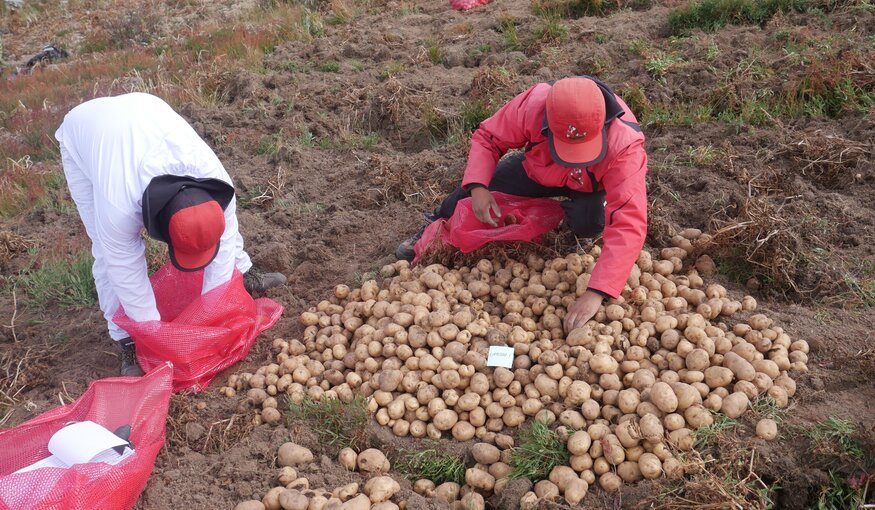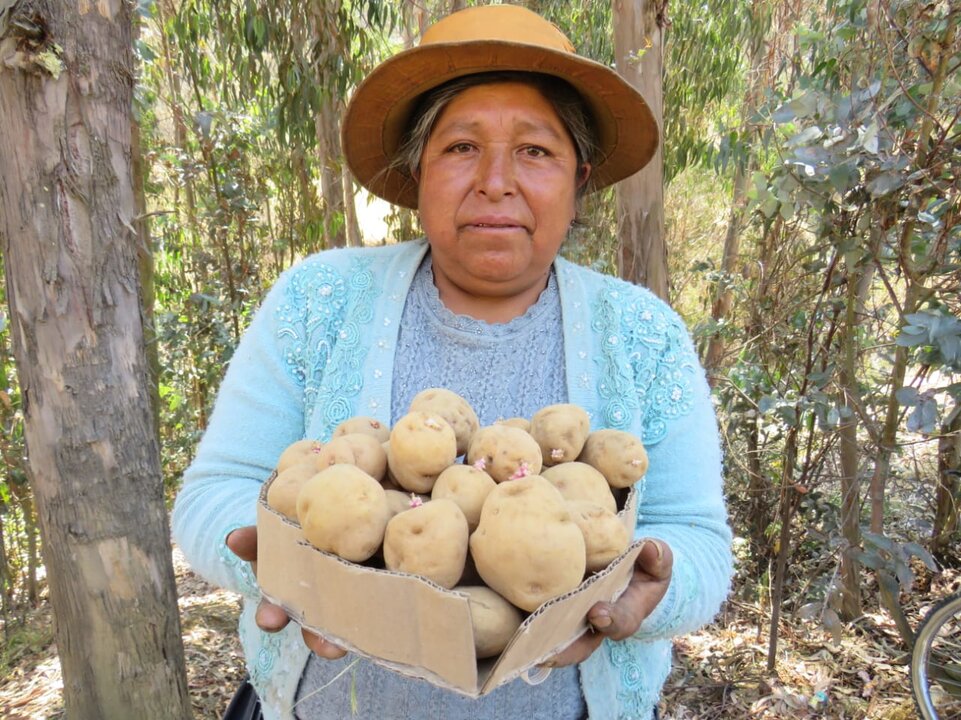Crop Trust and CIP Announce New Disease-Proof Potato
 CIP technicians harvest Matilde tubers in field trials. Photo: CIP
CIP technicians harvest Matilde tubers in field trials. Photo: CIP- A new potato named CIP-Matilde was developed by breeders in collaboration with farmers in Peru.
- It is both tasty and disease-resistant, helping to ensure potatoes remain a staple food that can withstand climate change.
- The new variety contains beneficial genes from wild potatoes transferred through a method called pre-breeding.
Berlin, October 14th, 2021 – On the occasion of the 42nd World Food Day, the Crop Trust and the International Potato Center (CIP) are announcing the release of a new disease-resistant potato called CIP-Matilde. The new potato’s resistance to disease will help to counteract the threat of climate change and global warming to conventional potatoes, ensuring this vital food crop remains a staple for future generations. The potato is the third most important food crop in the world, with hundreds of millions of farmers and consumers depending on it worldwide.
The new potato was developed by farmers, breeders, and scientists in Peru by identifying wild potatoes with resistance to disease and incorporating this resistance into cultivated varieties, a process known as pre-breeding. The outcome is a tasty tuber suitable for regular consumption that also withstands late blight, an aggressive disease that can destroy a potato crop in a matter of weeks.
Late blight, which is becoming increasingly common due to global warming, poses a serious threat to existing potato crops. CIP-Matilde, which has been in development since 2010, should ensure that edible potatoes remain available to humankind in the long-term. At present, late blight costs potato farmers up to USD 10 billion every year.
“Late blight can destroy everything. It can leave you without enough to eat, to sell, not even enough to use for seed,” said Rolando Papuico, a potato farmer from the Huancayo province, where the CIP-Matilde variety was developed. “I recommend Matilde to other farmers because it produces a lot, the potatoes taste good—boiled, mashed, fried, in soup—and late blight doesn’t affect it the way it does other varieties. I’m thankful to have this new variety because now I don’t have to invest so much in agrochemicals.”
CIP-Matilde was developed by the International Potato Center (CIP) with the support of the Crop Trust through its Crop Wild Relatives Project, an 11-year initiative to help agriculture adapt to climate change.
"Ensuring food and nutrition security under the stress of climate change means we need to harvest the power of the genetic diversity in our midst,” says Barbara Wells, the Director General for CIP and Global Director of Genetic Innovations at One CGIAR. “CIP-Matilde is just one great example of that work—and only the first of many to come.”
“Pathogens, pests and weeds can cause major crop losses, particularly in the developing world,” says Benjamin Kilian, manager of the Crop Wild Relatives Project at the Crop Trust. “By adapting our agriculture to these threats, we can help ensure a food-secure future.”
 Farmer Mariluz Cardenas holds CIP-Matilde tubers. Photo: CIP/J Huanai
Farmer Mariluz Cardenas holds CIP-Matilde tubers. Photo: CIP/J Huanai
For more information, visit https://www.croptrust.org/event/world-food-day-cip-matilde/
For interview requests and media inquiries, please contact:
Dominic Walker, ABCD Agency at dominic@abcd.agency
About the Crop Trust: The Global Crop Diversity Trust, known as the Crop Trust, is an international organization that aims to conserve and use plant genetic resources. It supports genebanks, the Svalbard Global Seed Vault, and proactive pre-breeding efforts around the world. The Crop Trust is recognized as an essential component of the funding strategy of the International Treaty on Plant Genetic Resources for Food and Agriculture. For more information, see www.croptrust.org.
About the International Potato Center (CIP): CIP is a research-for-development organization with a focus on potato, sweet potato and Andean roots and tubers. It delivers innovative science-based solutions to enhance access to affordable nutritious food, foster inclusive sustainable business and employment growth, and drive the climate resilience of root and tuber agri-food systems. Headquartered in Lima, Peru, CIP has a research presence in more than 20 countries in Africa, Asia and Latin America.
Categories: For The Press, Press Releases
